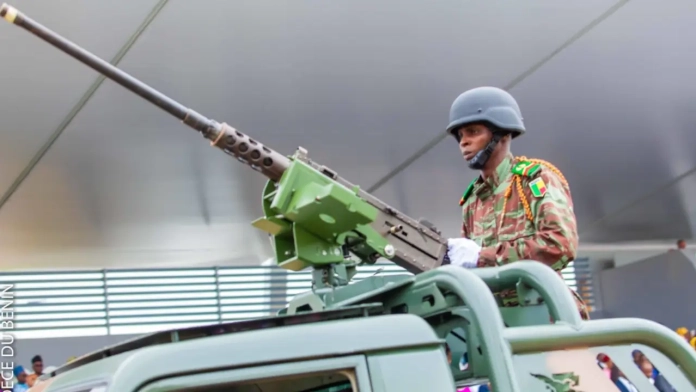At a time when warfare is no longer confined to the battlefield but extends into the realm of information, the Beninese armed forces are facing a dual challenge: ensuring national security while mastering their narrative. It’s a slow but inevitable shift, shaped by new forms of conflict where firearms coexist with narrative weapons.
Long perceived as a closed and silent institution, the Beninese military is undergoing a strategic shift. “We are no longer the silent giant, but we won’t become a loud parrot either,” says Lieutenant Colonel Ebenzer Honfoga, spokesperson for the General Staff of the Beninese Armed Forces. This transition aims to strike a balance between the duty of discretion and the growing need to inform a connected and increasingly reactive population.
The evolution is even more pressing as the country now faces regular attacks from armed terrorist groups. The emotional impact of these assaults — including the one on April 11, 2025 — often spills over onto social media, which becomes saturated with misinformation. In such critical moments, the military’s prolonged silence creates a vacuum quickly filled by disinformation.
It’s a dilemma acknowledged by Colonel Honfoga, who underlines the challenge of safeguarding ongoing operations while also meeting the public’s legitimate expectation for timely updates. “Speed is not our priority — operational success comes first,” he insists. As a result, the army refrains from releasing partial reports until search operations are completed, prioritizing accuracy and objectivity.
However, this cautious stance clashes with the demands of a public hungry for transparency and an enemy adept at navigating the rules of information warfare. As Régis Houp, an expert in strategic communication and geopolitics, explains: “An army that doesn’t control its own narrative lets others do it in its place.” In today’s context, that narrative void is often filled by terrorist propaganda, which aims to undermine national morale.
Toward Benin’s narrative sovereignty
The task ahead is clear: to build a uniquely Beninese narrative, one rooted in the country’s socio-cultural and strategic realities while drawing on effective practices seen elsewhere. Unlike Sahelian armies, whose communication is often shaped by political or militaristic agendas, Benin’s doctrine favors caution, adaptability, and a gradual buildup of communication capacity.
According to Beninese military authorities, this approach is already taking shape. A dedicated module on military communication has been introduced at the National Defense Academy, and efforts are underway to strengthen cooperation with national media, who are now more involved in crisis management. Yet for Régis Houp, one key step remains: “We need to go further — use social media, community radio, and speak in our national languages. That’s how the army will earn the trust of the population.”


